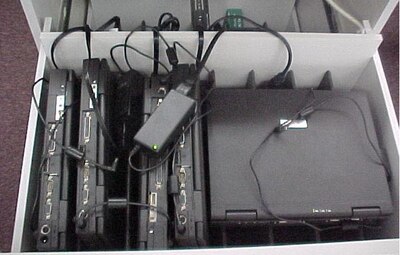School districts in Colorado have known for several years that the new computer-based tests were coming.
Anxiety was high about network capacity, having adequate numbers of laptops and other devices, student keyboard skills, disruption of instruction and other concerns.
Two years ago, one district technology executive rated schools’ readiness for online testing at “C-minus“ (see story). But district leaders were feeling more confident on the eve of new tests last winter (see story).
When we asked the state’s 20 largest school districts about their opt-out rates, we also spent some time discussing how the PARCC exam went. Here’s a sampling of what testing coordinators from around the state had to say.
Technology readiness – With the first full set of online tests behind them, testing officials in large districts said things went reasonably well on the technology front.
Practice testing during the 2013-14 school year was a big help. “Overall I think they [the testing sessions] were pretty successful,” said Carmen Williams of the Thompson district, echoing what others said. “We worked the whole year to prepare.”

Student reaction – Most assessment directors said most students seemed to do fine with computers. “At the elementary level, students were fine with testing online. In fact, many of them were more engaged during the testing process,” said Mya Martin-Glenn of Aurora. “At middle and high schools, students seemed to be happy with the tests moving from pencil/paper to online.
But, echoing the comments of others, Martin-Glenn said, “Some students took issue with the amount and length of tests, especially in high schools.”
Classroom disruption – Opinions varied about how much testing disrupted learning and regular classroom activities. Some testing directors said it was less of a problem in elementary school but more of a challenge in high school, where schedules are more complicated.
“Testing schedules did impact schools, but not as much as we thought,” said Brighton’s Peggy Robertson. “We were able to finish instruction and have normal activities.”
But Eric Mason, assessment coordinator for District 11 in Colorado Springs, said, “The biggest issue our schools faced was the amount of time we had to shut down our computer rooms for testing. We felt like we couldn’t mess with the computers.”
Tech support – Opinions varied on the support provided by Pearson, the testing company that ran the PARCC tests. “The customer service was horrible,” said Jeni Gotto from Adams 50. Other testing directors were less critical, but several agreed that they often had to go to the second level tech support go get the help they needed.
The biggest complaint – “The biggest challenge for us was having different testing windows,” said Cherry Creek’s Norm Alerta. Student data had to be checked and reloaded before every set of tests, he said, “a very difficult logistical task.”
So, collapsing the testing windows is “huge” said Creek assessment coordinator Linda Elliott.
“That should make it much better next year,” said Janeen Demi-Smith of District 11.


